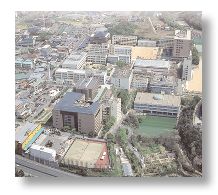
 |
 Kobe Gakuin University
is situated at the western edge of Kobe, a city well-known as a major center of international trade. The spacious campus of
the university crowns a lush green hill overlooking the smaller city of Akashi (situated at exactly 135°east longitude), the Akashi Straits and the Akashi Kaikyo
Bridge, the largest suspension bridge in the world, which was completed in the Spring of 1998.
Kobe Gakuin University
is situated at the western edge of Kobe, a city well-known as a major center of international trade. The spacious campus of
the university crowns a lush green hill overlooking the smaller city of Akashi (situated at exactly 135°east longitude), the Akashi Straits and the Akashi Kaikyo
Bridge, the largest suspension bridge in the world, which was completed in the Spring of 1998.
Founded in 1966 as a coeducational institution, Kobe Gakuin University began with the Faculty of Nutrition. The Faculties of Law and Economics
were added in the following year, and the Faculty of Pharmaceutical Sciences, with Departments of Pharmacy and Biopharmacy, in 1972. Later, the Faculty of Humanities
and Sciences was established in 1990, the Department of Business Administration was added to the Faculty of Economics in 1993, and the Department of International Relations and Law to the Faculty of Law in
1994. Over the years, the university has grown into a multi-discipline institution comprising five faculties and eight departments, with well-balanced programs in the humanities, and the social and natural
sciences. In addition, the Department of International Economics and of Human Behavior are to be in operation from April 2000.
In 1974, the Graduate School was founded, offering graduate programs in law, economics, nutrition, pharmaceutical sciences, and food and medicinal
sciences. With the establishment of the Graduate School of Humanities and Sciences, the university has expanded the breadth of its contribution to society as an institution for scientific research.
The objective of a good university is to foster intellectual, ethical, and practical capabilities through the pursuit of a broad range of knowledge and
in-depth research in specialized fields. Based on its founding spirit of “love of truth and respect for individuality,” Kobe Gakuin University aims to nurture a broad and profound outlook on life
and the world, and to produce active and creative members of society through education. The university also aims to cultivate internationally minded persons with a global perspective, and a national awareness
supportive of Japan's future in a drastically changing world. To achieve these objectives, particular emphasis is placed on faculty consolidation, with small-sized classes or seminars offered from the early
stages to provide venues for exchange between students and faculty members. Furthermore, efforts are made to enhance learning and research through the use of computers in class, through inviting specialists
from overseas, and through the admission to the student body of foreign students.
In addition, as concrete measures for opening the university to the public and for realizing the ideal of education integrated with the local community,
open courses and high-level courses in arts and culture are offered and highly appreciated by the local people.
Statistics
| Number of Undergraduate Students |
|
(As of April 1, 2000) |
|
Academic Year |
1 | 2 | 3 | 4 | Total |
| Faculty | |||||
| The Faculty of Law | 658 | 754 | 790 | 943 | 3,145 |
| The Faculty of Economy | 747 | 802 | 787 | 835 | 3,171 |
| The Faculty of Humanities and Sciences | 461 | 421 | 403 | 386 | 1,671 |
| The Faculty of Nutrition | 112 | 110 | 116 | 95 | 433 |
| The Faculty of Pharmaceutical Sciences | 253 | 246 | 209 | 203 | 911 |
| Total | 2,231 | 2,333 | 2,305 | 2,462 | 9,331 |
| Number of Graduate Students |
|
(As of April 1, 2000) |
|
Academic Year |
1 | 2 | 3 | 4 | 5 | Total |
| Graduate School Division | ||||||
| The Graduate School of Law | 15 | 22 | 0 | 0 | 6 | 43 |
| The Graduate School of Economics | 12 | 7 | 0 | 0 | 1 | 20 |
| The Graduate School of Humanities and Sciences | 8 | 13 | 1 | 4 | 17 | 43 |
| The Graduate School of Nutrition | 3 | 4 | -- | -- | -- | 7 |
| The Graduate School of Pharmaceutical Sciences | 21 | 21 | -- | -- | -- | 42 |
| The Graduate School of Food and Medicinal Sciences | -- | -- | 1 | 2 | 1 | 4 |
| Total | 59 | 67 | 2 | 6 | 25 | 159 |
| Number of University Staff |
|
(As of April 1, 2000) |
|
Position |
President | Professors | Associate Professors | Assistant Professors | Assistants | Total |
| Faculty | ||||||
| The Faculty of Law | 1 | 24 | 6 | 8 | -- | 39 |
| The Faculty of Economics | -- | 30 | 5 | 3 | -- | 38 |
| The Faculty of Humanities and Sciences | -- | 33 | 12 | 0 | -- | 45 |
| The Faculty of Nutrition | -- | 10 | 6 | 0 | 5 | 21 |
| The Faculty of Pharmaceutical Sciences | -- | 19 | 8 | 7 | 12 | 46 |
| Total | 1 | 116 | 37 | 18 | 17 | 189 |